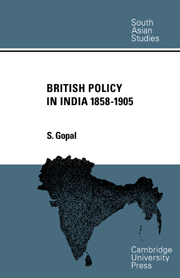Book contents
- Frontmatter
- Contents
- Preface
- Map 1 The Annexation of Burma
- Map 2 Afghanistan and Central Asia
- 1 The Aftermath of The Revolt, 1858–69
- 2 The Conservative Adventure, 1869–80
- 3 The Liberal Experiment—Ripon and Dufferin
- 4 Return to Caution, 1888–98
- 5 Curzon: The Apogee of Administration
- Conclusion
- Notes
- Bibliography
- Index
3 - The Liberal Experiment—Ripon and Dufferin
Published online by Cambridge University Press: 02 December 2009
- Frontmatter
- Contents
- Preface
- Map 1 The Annexation of Burma
- Map 2 Afghanistan and Central Asia
- 1 The Aftermath of The Revolt, 1858–69
- 2 The Conservative Adventure, 1869–80
- 3 The Liberal Experiment—Ripon and Dufferin
- 4 Return to Caution, 1888–98
- 5 Curzon: The Apogee of Administration
- Conclusion
- Notes
- Bibliography
- Index
Summary
When, after the elections of 1880, Gladstone returned to office, the appointment to the Indian viceroyalty received his special attention. He urged Kimberley to accept what seemed to him to be a post more important than all except perhaps two of the offices for which he had to recommend in Britain. ‘To mere ambition I do not desire to appeal, but I feel that at no period of its existence has the office offered brighter promise of reward in the highest forms of which it is susceptible.’ The Prime Minister believed that it was an unprecedented opportunity for erasing the blots of the Lytton regime and introducing the principles for which Gladstone and the Liberal party stood. Kimberley, however, declined, whereupon the Prime Minister sought to persuade Goschen; and it was only when the latter also refused that the post was offered to Ripon. Compelled to consider Ripon because of the unavailability of others whom he thought more suitable, Gladstone finally selected Ripon more with a view to fulfilling party commitments and avoiding Ripon's claims to membership of the Cabinet than because of his aptitude or ability. But Gladstone never later regretted his decision. Ripon had not the vibrant and compulsive influence of his leader, but he shared the latter's hopes and ideals and did his utmost to implement them in India. The immediate achievements were minor, but the impact on the minds of Indians was far-reaching.
- Type
- Chapter
- Information
- British Policy in India 1858-1905 , pp. 129 - 179Publisher: Cambridge University PressPrint publication year: 1965
- 1
- Cited by

